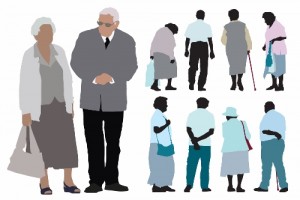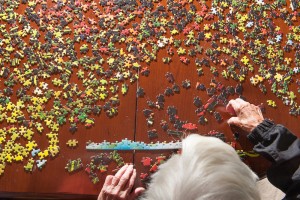 There’s a little quip that I’ve heard in senior communities that goes something like this; “I’m looking for Mrs. B., can you tell me what she looks like? “Yes, she’s the one with gray hair and glasses!” Not that original, really, but you get the picture. I’ve often been struck with profound awareness when I enter the dining room of a nursing home. At first glance it looks like a sea of gray heads and everyone sort of blends together. The quip suggests these old folks all look alike so they are alike and have morphed into some other kind of creature. At what point do we become one of “them”? I have a psychologist friend who counsels young children. She once told me that she’s effective because she doesn’t talk down to the kids or treat them as “pre-people”. Something about her comment rings true and, by comparison, I think we live in a society that views our aging population as “former people”. When do we lose our individual identity and become a former person?
There’s a little quip that I’ve heard in senior communities that goes something like this; “I’m looking for Mrs. B., can you tell me what she looks like? “Yes, she’s the one with gray hair and glasses!” Not that original, really, but you get the picture. I’ve often been struck with profound awareness when I enter the dining room of a nursing home. At first glance it looks like a sea of gray heads and everyone sort of blends together. The quip suggests these old folks all look alike so they are alike and have morphed into some other kind of creature. At what point do we become one of “them”? I have a psychologist friend who counsels young children. She once told me that she’s effective because she doesn’t talk down to the kids or treat them as “pre-people”. Something about her comment rings true and, by comparison, I think we live in a society that views our aging population as “former people”. When do we lose our individual identity and become a former person?
Ageism – Putting on the Brakes
 Ageism is defined as prejudice or discrimination on the basis of someone’s age. Civic and business leaders across the globe are accelerating “age friendly – dementia friendly” initiatives. The explosive growth of worldwide population marching quickly toward old age is forcing change in virtually every area of society. Cities are redesigning transporation systems, public centers and revamping outdated services. At the same time, business leaders are turning toward experts to achieve productive workplace teams made up of 4 or 5 generations. Health and long term care is turning toward technology and how to train and retain the workforce needed to provide services for today’s elders that at a growing clip will be among the largest oldest group we have ever witnessed – centenarians.
Ageism is defined as prejudice or discrimination on the basis of someone’s age. Civic and business leaders across the globe are accelerating “age friendly – dementia friendly” initiatives. The explosive growth of worldwide population marching quickly toward old age is forcing change in virtually every area of society. Cities are redesigning transporation systems, public centers and revamping outdated services. At the same time, business leaders are turning toward experts to achieve productive workplace teams made up of 4 or 5 generations. Health and long term care is turning toward technology and how to train and retain the workforce needed to provide services for today’s elders that at a growing clip will be among the largest oldest group we have ever witnessed – centenarians.
Dementia Care – A Circle of How Many..?
 It’s 10:30 in the morning. Your job is to facilitate the reading of the morning newspaper to a group of dementia care patients and you have a choice as to how to best carry it out.
It’s 10:30 in the morning. Your job is to facilitate the reading of the morning newspaper to a group of dementia care patients and you have a choice as to how to best carry it out.
Option #1. You gather a group of thirty or so people into a large circle while you summarize the newspaper headlines and articles aloud.
Option #2. You gather a group of five around a small table. Each holds a copy of the paper, turning the pages while one, or more, read the headlines, taking the group in a multitude of conversational directions.
As the leader, which would you choose?
Now put yourself in the place of a person living with dementia and imagine you have difficulty, integrating sounds, figuring out the environment, seeing and hearing who is talking and wondering if they are even talking to you.
Caregiver – Ask for Advice and Opinions
 Family members and professionals alike struggle with how to interact with a person living with the bewildering condition of dementia. As a caregiver, it’s easy to forget that this person can often answer and follow much more of a conversation than given credit for.
Family members and professionals alike struggle with how to interact with a person living with the bewildering condition of dementia. As a caregiver, it’s easy to forget that this person can often answer and follow much more of a conversation than given credit for.
These are two “magic phrases” that many times will get the person’s attention and foster meaningful interaction: “Would you help me with this?” and “I need your help”. Individuals still long for a sense of purpose and when engaged in this way, he/she indeed feels that they are still a part of things.
We all feel valued and respected when asked to give advice or to help with something. As a caregiver, we feel we matter. The same is still true for people with dementia. Although the advice or help may or may not be quite on track, they will notice that we asked and are willing to listen to them. The same feelings of value and respect remain.
Actually, more times than not, I’m surprised by the response that tells me the person not only knows what I’m talking about, but offers spot–on insight. I saw this first-hand when I recently visited my brother who has mid stage dementia. I was lamenting, mostly to myself, that I will be turning 60. I said, out loud, “Sixty! How did this happen?” Without missing a beat my brother replied, “Well, we grow older every year and wiser and then it just comes around to that.” I was shocked and it made me smile. I was given a reminder that he was still with me.
So, next time you are at a loss for how to connect, you might say, “Tell me your thoughts on…” (Recipes, a favorite season, songs, politics, or anything about just plain life). See what gems, humor, and stories you discover. The person with dementia will thank you for it.